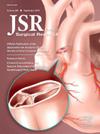Stitching the Story: Third-Y Clerkship Impact on Applicants to General Surgery Residency
IF 1.7
3区 医学
Q2 SURGERY
引用次数: 0
Abstract
Introduction
Medical students' clerkship experiences play a crucial role in shaping specialty interests. Factors such as mentorship, autonomy, and meaningful patient care contribute to clerkship quality and career decisions. Previous studies suggest that positive interactions with residents and attendings significantly influence students' likelihood of pursuing a specialty. This study evaluates key clerkship factors associated with students' interest in general surgery, focusing on mentorship, clinical exposure, and academic performance.
Methods
This retrospective study was conducted at a single medical school, analyzing data from students who completed their third-year surgical clerkship between May 2023 and December 2024. A deidentified survey assessed students' specialty preferences, clerkship timing, service assignments, team structures, and subjective factors influencing specialty choice. Performance data from the surgery shelf exam and clerkship grades were analyzed for associations.
Results
Among 144 respondents (27.6% response rate), 23.7% applied to general surgery. At the start of the third y, 18.0% were not interested in surgery, 39.6% were open-minded, 36.8% were interested, and 4.9% were committed. Notably, students exposed to postgraduate year-1 residents had a significantly higher likelihood of applying (odds ratio 1.887, P = 0.046). Direct participation in cases (60.6%), interactions with residents (56.7%), and faculty mentorship (52.0%) were key factors, whereas long work hours negatively impacted the interest.
Conclusions
This study highlights that direct clinical exposure, mentorship from junior residents, and active case participation strongly influence medical students' interest in general surgery. Although academic performance did not significantly impact specialty selection, subjective experiences and the quality of interactions played a pivotal role.
缝合故事:第三- y见习对申请普通外科住院医师的影响
医学生的见习经历对专业兴趣的形成起着至关重要的作用。诸如指导、自主和有意义的病人护理等因素有助于职员质量和职业决策。先前的研究表明,与住院医师和主治医师的积极互动显著影响学生追求专业的可能性。本研究评估与学生对普外科兴趣相关的关键见习因素,重点是指导、临床接触和学业表现。方法本回顾性研究在一所医学院进行,分析了2023年5月至2024年12月完成第三年外科实习的学生的数据。一项去识别调查评估了学生的专业偏好、实习时间、服务任务、团队结构和影响专业选择的主观因素。分析来自外科货架检查和见习等级的表现数据的相关性。结果144名回答者中,23.7%应用于普外科,回复率为27.6%。第三期开始时,18.0%的人对手术不感兴趣,39.6%的人持开放态度,36.8%的人感兴趣,4.9%的人承诺。值得注意的是,接触研究生一年级居民的学生申请的可能性显著更高(优势比1.887,P = 0.046)。直接参与案例(60.6%)、与住院医师互动(56.7%)和教师指导(52.0%)是关键因素,而长时间工作对兴趣产生负面影响。结论直接临床接触、初级住院医师指导和积极的病例参与对医学生对普外科的兴趣有显著影响。虽然学业成绩对专业选择没有显著影响,但主观体验和互动质量起着关键作用。
本文章由计算机程序翻译,如有差异,请以英文原文为准。
求助全文
约1分钟内获得全文
求助全文
来源期刊
CiteScore
3.90
自引率
4.50%
发文量
627
审稿时长
138 days
期刊介绍:
The Journal of Surgical Research: Clinical and Laboratory Investigation publishes original articles concerned with clinical and laboratory investigations relevant to surgical practice and teaching. The journal emphasizes reports of clinical investigations or fundamental research bearing directly on surgical management that will be of general interest to a broad range of surgeons and surgical researchers. The articles presented need not have been the products of surgeons or of surgical laboratories.
The Journal of Surgical Research also features review articles and special articles relating to educational, research, or social issues of interest to the academic surgical community.

 求助内容:
求助内容: 应助结果提醒方式:
应助结果提醒方式:


